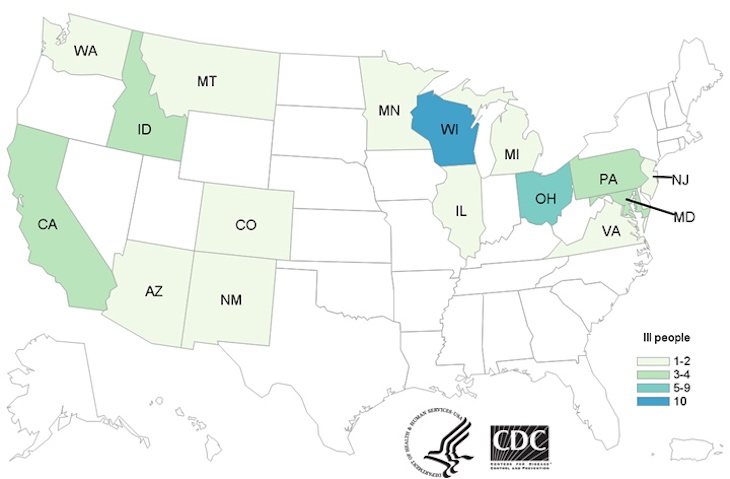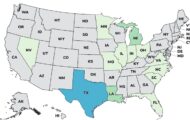The CDC just posted a food safety alert, telling consumers that in the wake of the newest E. coli HUS outbreak, they should avoid buying or eating all romaine lettuce from the Salinas, California growing region until more information is available. This is an echo of the same advice from the CDC last April, when another, deadly E. coli O157:H7 outbreak was linked to romaine. The advice in 2018 was to avoid all romaine lettuce until officials found the source.

This newest outbreak is growing by leaps and bounds. Now 40 people in 16 states are sick. That’s an increase of 23 more patients and 8 more states in just the last two days. Twenty-eight people have been hospitalized, which is a very high percentage of cases. Five people have developed hemolytic uremic syndrome (HUS), which is a type of kidney failure.
The case count by state is: Arizona (2), California (4), Colorado (1), Idaho (3), Illinois (1), Maryland (3), Michigan (1), Minnesota (1), Montana (1), New Jersey (1), New Mexico (2), Ohio (5), Pennsylvania (3), Virginia (1), Washington (1), and Wisconsin (10). Illness onset dates range from September 24, 2019 to November 10, 2019. The patient age range is from 3 to 89. Of 39 ill persons who were interviewed, 28, or 72%, have been hospitalized.
There are two specific recalls associated with this outbreak: Ready Pac Foods Bistro Chicken Caesar salad sold in Maryland’s Sam Club stores, and Missa Bay salads that were sold in Alabama, Connecticut, Florida, Georgia, Illinois, Indiana, Louisiana, Maine, Maryland, Massachusetts, Michigan, Minnesota, Mississippi, Missouri, New Jersey, New York, North Carolina, Ohio, Pennsylvania, South Carolina, Virginia, and Wisconsin. Those Missa Bay salads all have the establishment number “EST. 18502B” on the package and were sold in Giant Eagle, Target, Aldi, Walmart, Sam’s Club, Albertsons, Safeway, Vons, and Domino’s Pizza. You can see the list of recalled products at the USDA web site; it may not be complete. Do not eat any of these recalled products.
The CDC says that most romaine lettuce products are labeled with a harvest location showing where they are grown. But there’s a good chance that some won’t be. Consumers should ask their grocer and restaurants where the romaine lettuce they want to buy or eat came from if they aren’t labeled. If they don’t know, don’t eat it.

Minneapolis food safety lawyer Fred Pritzker said, “We hope that the romaine industry gets a handle on all this contamination before more people get seriously ill.” If you or a loved one has been diagnosed with an E. coli infection or HUS, you can contact Fred for help by calling 1-888-377-8900 or 612-338-0202.
The advice to avoid romaine from the Salinas area includes all types of romaine, including whole heads of romaine, hearts of romaine, and packages of precut lettuce and salad mixes which contain romaine, including baby romaine, spring mix, and Caesar salad. If you have romaine at home, if the package has “Salinas” on the label, throw it away. If it isn’t labeled, throw it away. If you don’t know if the lettuce is romaine or if a salad mix contains romaine, throw it away.
Then clean out the drawers and shelves in your fridge with a mild bleach solution to kill any remaining bacteria. Wash your hands well with soap and water after handling these products and after cleaning.
Symptoms of an E. coli O157:H7 infection include a mild fever, vomiting, severe and painful abdominal cramps, and bloody and watery diarrhea. Symptoms of HUS include little or no urine output, lethargy, pale skin, easy bruising, and bleeding from the nose or mouth. Anyone who is suffering from any of these symptoms needs to see a doctor immediately. They may be part of this romaine lettuce E. coli HUS outbreak.




